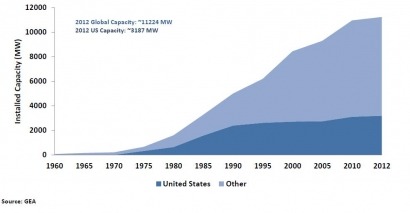
As of May 2012, there are approximately 11,224 MW of installed geothermal capacity online globally. The US remains the world leader with approximately 3,187 MW of installed capacity, but global market growth continues to outpace the U.S. by a noticeable margin.
“It is encouraging to see such widespread geothermal growth, as this baseload energy source has the potential to replace coal and other non-renewable power sources in countries around the world,” said GEA Executive Director Karl Gawell. "Worldwide, national policies are propelling growth in the strongest markets, but growth in the United States is still hindered by uncertainty about the direction of government policy.”
Outside of the US, countries like Turkey, Kenya and Indonesia continue to show promise for significant geothermal expansion. Turkey has been deemed one of the “hottest” European markets for geothermal, and is the seventh most promising country in the world, with 2,000 MW of geothermal potential.
According to the report, global geothermal growth can be attributed to a number of factors, including economic growth, the electrification of low-income and rural communities, new technology, increased energy security concerns and favourable national policies. Nicaragua and Indonesia have both benefited from favourable policy to become strong geothermal markets. Particularly in the US, unpredictable government policy has slowed growth, but federal agencies such as the USTDA, USAID and the EXIM have all created programs to foster geothermal growth at home and abroad.
“Federal tax credits for geothermal in the US expire at the end of 2013, making it difficult for many projects with long lead times to move forward in this unpredictable economic climate,” Gawell said. “The way to ensure constant and steady industry growth domestically is for Washington to extend renewable energy tax incentives and promote policies consistent with industry needs for sustained growth and technology advancement.”
For additional information:

